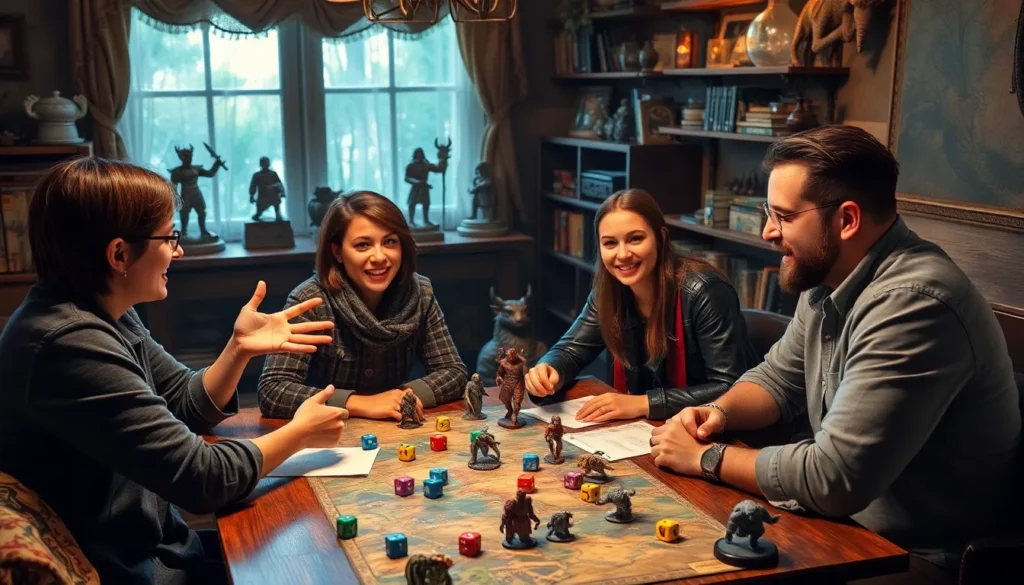In a world where dragons soar and wizards cast spells, fantasy role-playing offers an escape from the mundane. It’s not just about rolling dice and slaying imaginary beasts; it’s about crafting epic tales and forging unforgettable friendships. Whether players are strategizing in a dark dungeon or negotiating peace with a stubborn troll, every session is a new adventure waiting to unfold.
Table of Contents
ToggleOverview of Fantasy Role Playing
Fantasy role playing immerses players in imaginative worlds filled with rich narratives and diverse characters. Players often assume the roles of unique characters, each possessing specific abilities and traits that influence the unfolding story. Storytelling becomes central to the experience, driving interactions and decisions throughout the game.
In many cases, sessions involve cooperation, where players collaborate to overcome challenges together. These challenges can range from complex puzzles within dungeons to negotiations with mystical beings. Each character’s choices impact the overall storyline, leading to varying outcomes and distinct adventures.
Players frequently engage in combat, but the excitement often lies in strategizing and exploring narrative possibilities. Engaging in diplomacy can unlock new paths, while combat scenarios test teamwork and individual skills. Many campaigns incorporate character development, allowing players to enhance their skills and grow their characters over time.
Dice rolling introduces an element of chance, shaping the narrative flow and providing unpredictability. Each roll may lead to unexpected twists, ensuring that no two sessions are the same. Fantasy role playing often fosters deep connections among participants, building friendships through shared experiences and storytelling.
Groups create their unique settings with specific rules, expanding the genre’s versatility. Boundaries between genres blur, allowing players to explore everything from high fantasy to dark fantasy realms. Ultimately, fantasy role playing serves as a platform for creativity, communal storytelling, and immersive adventure.
History of Fantasy Role Playing

Fantasy role-playing has evolved through rich literary traditions and innovative gaming formats. This evolution has shaped the immersive experiences that players enjoy today.
Origins in Literature
Fantasy role-playing draws inspiration from classic literary works. Authors like J.R.R. Tolkien and C.S. Lewis laid the groundwork for fantastical worlds and epic quests. Their narratives introduced iconic themes of heroism, adventure, and morality. These stories captivated audiences, encouraging imaginative gameplay. Players found ways to interact with these beloved characters and settings, entering a realm where creativity flourished. Literature’s influence remains evident in many game mechanics and narratives today.
Development of Tabletop Games
Tabletop games emerged as a significant advancement in fantasy role-playing. In 1974, Dungeons & Dragons (D&D) marked a pivotal point, providing structured gameplay elements. This game offered rules for character creation, combat, and story progression. Players began to gather in groups, sharing experiences through collaborative storytelling. Over the years, various systems arose, allowing flexibility in gameplay and fostering unique universes. The tabletop format encouraged social interaction, making it a cornerstone for the role-playing community.
Key Elements of Fantasy Role Playing
Fantasy role-playing games rely on several key elements to create immersive and engaging experiences. These elements shape gameplay and enhance storytelling, providing depth and intrigue.
World Building
World building involves creating intricate settings that serve as the foundation for adventures. Each realm features unique cultures, histories, and geographies that define its character. Environments can vary from magical forests to sprawling cities filled with diverse inhabitants. Players explore narrative possibilities through places filled with secrets and lore. The richness of the world enhances player immersion, allowing them to engage deeply with the story. Unique landscapes and local traditions foster a sense of place, offering endless opportunities for adventure and conflict.
Character Creation
Character creation empowers players to design unique avatars that represent their personas within the game. Players select races, classes, and abilities that reflect individual play styles and visions. Customization aspects can include everything from appearance to background stories. Characters often evolve through experiences, gaining skills and developing relationships with other characters. The process encourages creativity and investment in the game, as players become attached to their characters. Every player contributes distinct personality traits and motivations, enriching the overall narrative experience.
Game Mechanics
Game mechanics establish the rules and systems driving gameplay. Core elements include dice rolling for skill checks, combat resolution, and movement. Mechanics govern interactions between characters and the environment, impacting outcomes of decisions and actions. These systems create a balance of chance and strategy, adding excitement to each gaming session. Players navigate challenges using their abilities, whether through combat, negotiation, or problem-solving. Integrating mechanics with storytelling ensures players remain engaged, as the game reacts dynamically to their choices.
Popular Fantasy Role Playing Systems
Fantasy role-playing encompasses a variety of systems that enhance the gameplay experience. Some notable systems have gained immense popularity among enthusiasts.
Dungeons & Dragons
Dungeons & Dragons (D&D) stands as the cornerstone of fantasy role-playing. Created in 1974, it introduced structured gameplay, allowing players to embark on epic quests filled with exploration and combat. Players assume the roles of diverse characters, each contributing unique abilities. The Dungeon Master guides the adventure, crafting narratives and presenting challenges. Expansions and different editions maintain the game’s relevance, continually attracting new players. D&D’s impact on the role-playing genre is profound, influencing countless systems that followed.
Pathfinder
Pathfinder emerged as a popular alternative to Dungeons & Dragons. It built upon the D&D 3.5 system, enhancing character customization and depth. Players appreciate the robust rules governing various aspects, from skills to spells. Enriched world-building allows for exploration of expansive settings, compelling campaigns, and engaging storylines. Frequent updates introduce new content and maintain player interest. Pathfinder fosters creativity while still capturing the essence of traditional role-playing experiences.
Other Notable Games
Several other systems complement the fantasy role-playing landscape. Shadowrun blends fantasy elements with cyberpunk, offering a unique narrative style. Fate Accelerated emphasizes storytelling and character development, enabling players to influence the game’s direction. Call of Cthulhu focuses on horror and investigation, immersing players in Lovecraftian lore. Systems like GURPS provide universal mechanics applicable across genres. These games expand the diversity of role-playing experiences, catering to various interests and play styles.
The Impact of Fantasy Role Playing
Fantasy role-playing games significantly enhance social interactions among players. They create opportunities for collaboration, as individuals unite to confront challenges together. Shared storytelling fosters communication and strengthens friendships through common experiences. Players engage in discussions about strategies, character motivations, and narrative developments, deepening connections beyond the game. Through their interactions, they develop teamwork skills that apply in various life aspects.
Creativity and imagination thrive in fantasy role-playing environments. Players craft unique characters, each with distinct backgrounds and abilities, reflecting personal creativity. Diverse worlds inspire innovative thinking as players navigate complex narratives. Acting out roles encourages participants to explore different perspectives, enhancing empathy and understanding. Each gaming session provides a safe space to experiment with ideas, cultivating problem-solving skills. Collaborative storytelling allows for unexpected plot twists, making each adventure unique and memorable.
Fantasy role-playing games offer a captivating blend of imagination and collaboration. They create immersive experiences that allow players to escape reality while forging lasting friendships. Each session unfolds unique narratives shaped by individual choices and teamwork, making every adventure memorable.
The genre’s evolution has brought diverse systems that cater to various play styles and interests. As players explore intricate worlds and develop their characters, they engage in rich storytelling that enhances empathy and creativity. Ultimately, fantasy role-playing serves as a powerful platform for social interaction, where shared experiences lead to deeper connections and unforgettable journeys.








